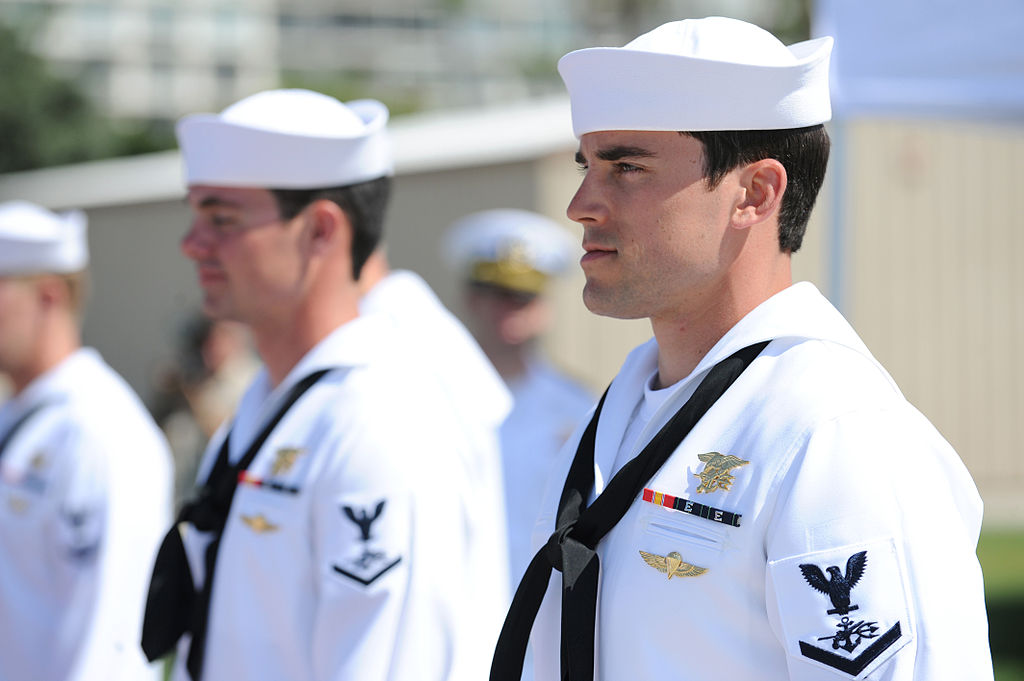The Gallagher Case: President Trump Corrupts the Profession of Arms
The dispute between Defense Secretary Mark Esper and former Navy Secretary Richard V. Spencer may be at the forefront of the news cycle, but the real story is the corruption of military good order and discipline.

Published by The Lawfare Institute
in Cooperation With

Chief Petty Officer Eddie Gallagher previously made headlines when he was found not guilty by a court-martial of murdering a wounded Islamic State captive but was convicted of the dereliction of improperly posing with the dead body. Now Gallagher, a Navy SEAL, is back in the news as controversy rages over a Navy review to decide whether Gallagher should forfeit his status as a SEAL. It appears that when President Trump seemed poised to stop the review, Secretary of the Navy Richard V. Spencer proposed his own solution—a sham review process with a preordained outcome—and was fired as a result. Spencer portrayed his actions as a point of honor in response to what he saw as an inappropriate intervention by the president. Secretary of Defense Mark Esper, in contrast, was adamant that he fired Spencer for bypassing Esper to propose a deal to Trump that would allow the process to seemingly proceed but would guarantee Gallagher would still retire with his Trident.
This chaos in military discipline and personnel actions is the direct result of Trump’s reckless dismissal of the judgments of his military commanders and his misunderstanding of the profession of arms. The president has legal authority to intervene in these matters, but his misguided actions risk not only undermining the authority of his commanders but also eroding the honor and integrity of the U.S. armed forces. The Spencer/Esper soap opera may be at the forefront of the news cycle, but the real story is the corruption of military good order and discipline.
Trump’s overt disdain for the highly effective military justice system and the commanders who rely on it to hold subordinates accountable for battlefield misconduct has been on display from the inception of Gallagher’s court-martial. His disdain was apparently not tempered even after Gallagher was acquitted for the most serious charges of war crimes. Instead, the president intervened to reverse the punishment meted out by the same military jury that acquitted Gallagher of the most serious offenses.
This raises the question: Why was the military jury’s judgment to acquit so worthy of praise but their judgment to punish so deserving of condemnation? The answer seems unfortunately clear: The president presumes to understand accountability for battlefield misconduct more than his own highly experienced military commanders. And he presumes to understand what type of military wins wars and what type of professional warrior ethic imbues the American military. The trouble is that he misunderstands the issues of both force and ethic. The force that wins wars is disciplined, not unrestrained and indiscriminate. And the ethic of the U.S. military is one of honor gained by adherence to the rules of war no matter how extreme the situation, or how powerful the temptation to break them.
This same misunderstanding is evident in the president’s termination of the process initiated by the Navy admiral in charge of all SEALs to assess whether Gallagher’s court-martial conviction should result in his loss of the coveted SEAL Trident. The admiral’s command action is not unusual, and similar personnel actions in response to subordinate misconduct occur all the time as part of the effort to maintain good order and discipline. Gallagher’s record of courageous service in some of the most demanding combat situations imaginable would certainly have been fully considered by this process. But so would the fact that he was found guilty of what amounted to a war crime committed in front of his subordinates and now on full display for the entire nation.
The admiral who leads the Navy special operators clearly understands something that the president may not: leaders’ actions, both good and bad, are replicated and exaggerated. Gallagher was a senior noncommissioned officer in an elite unit expected to embrace and uphold the highest standards of ethical conduct while plying their warfighting trade. History teaches that when leaders cross the line of illegality, the negative effect is profound on those who look to them as examples of “what right looks like.” Gallagher’s conviction not only cast doubt on his personal fitness for continued Navy SEAL eligibility, but it also necessitated disciplinary and personnel action to signal to those who see him as a victim that the true victim of this incident was the integrity of the U.S. military profession.
Many—perhaps including the president—may consider the crime for which Gallagher was convicted, of posing for photos with a dead enemy, quite trivial. But discipline in war means following rules. These rules are part of U.S. and international law—in fact, international law that the U.S. was the first to codify—and central to the legitimate use of national military power. This law vests warfighters like Gallagher with immense lethal power, but this power is not unlimited. No violation of these rules is ever trivial, and history is replete with examples of how such misconduct festered into a culture of ill-discipline—something the SEAL command has already expressed concern over. In truth, Gallagher’s commanders would have been derelict had they treated his misconduct with the same indifference as did their commander in chief.
The president’s intervention on Gallagher’s behalf before the Trident review process was allowed to run its course corrodes confidence in the entire military disciplinary structure. Even more troubling, it reflects a lack of trust in the judgment of those responsible for leading U.S. armed forces in combat—in this instance, naval leadership. Gallagher said in a recent Fox News interview that the review process was all about his commander’s ego. He may be right about that. But the ego at issue is more likely that of his commander in chief—who acted impulsively based on a misguided instinct to view Gallagher as a victim—than that of Navy leaders, who justifiably questioned whether Gallagher still deserves that Trident.




.png?sfvrsn=48e6afb0_5)

